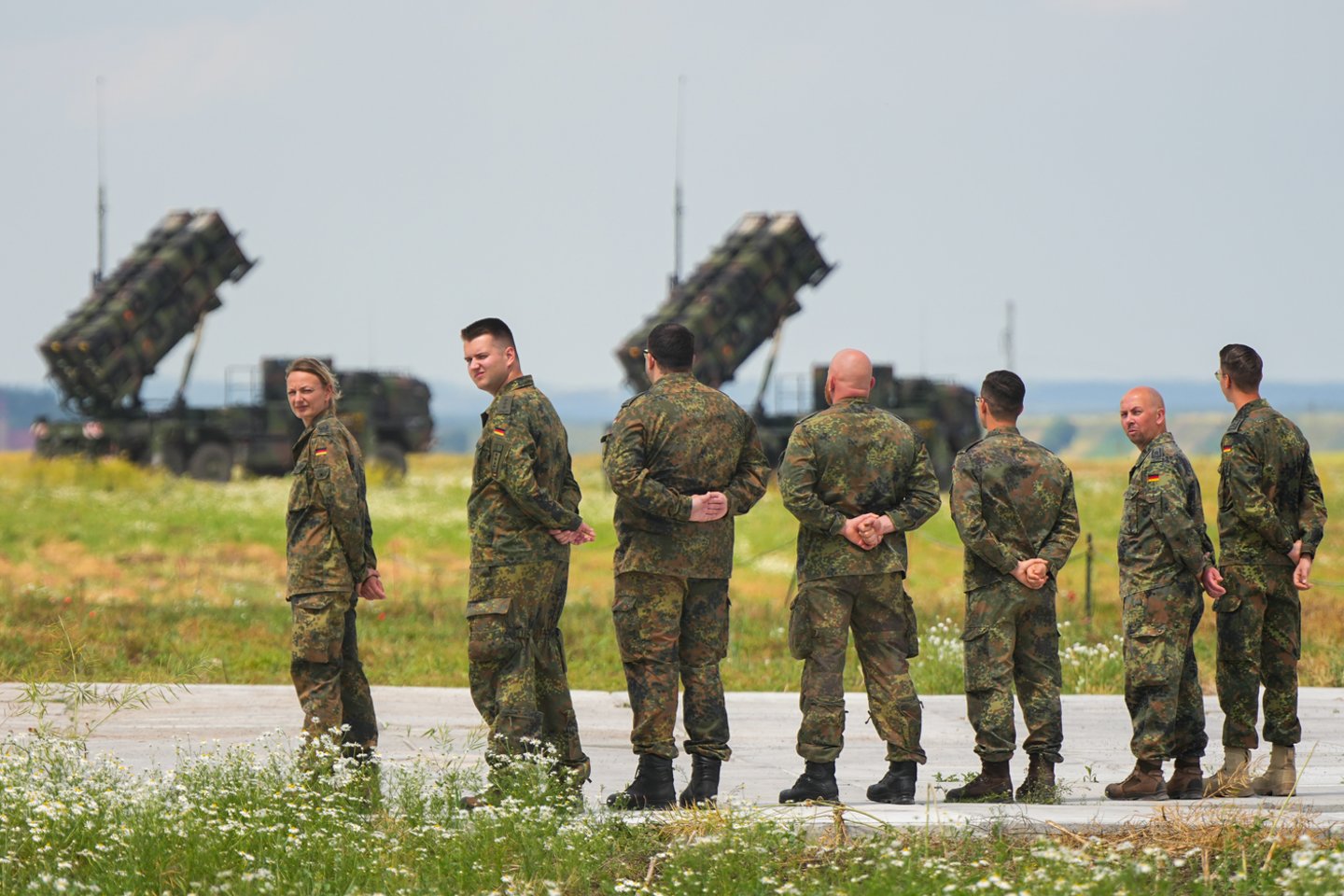Although the NATO summit is described as historic for Lithuania, but not for other countries such as Ukraine, not all of the wishes of Lithuania's top officials have been fulfilled by its allies.
What is changing?
The new 4,400-page NATO Defence Plans detail what NATO members would do if Russia attacked any of them, and the very concept of defence of NATO territory has been changed.
Previously, the Baltic countries would have had to withstand a Russian attack on their own until the Alliance allies arrived, with the territory already occupied being recaptured with NATO assistance.
Under the new defence plans, NATO countries would respond immediately to military aggression, with defences in place from the first days of the conflict.
The allies agreed to increase the number of high-readiness troops by a factor of seven from the current 40,000. The EU has also increased the number of troops available for NATO's Rapid Reaction Force from seven thousand to 300,000.
Although the decision on the 300,000 troops was already taken at the Madrid Summit last year, it seems that the increase was not an easy task for the Alliance members.
The plans identify the countries and specific territories they would defend and with which specific forces: German troops would defend Lithuania, US troops would defend Poland, Canadian troops would defend Latvia and British troops would defend Estonia.
The specific troops would familiarise themselves with the territory to be defended in advance, would conduct exercises there, and the troops' military equipment could be moved to these areas in advance.
The announcement that "the Alliance will reinforce battle groups in the eastern part of the Alliance to brigade-sized units" was also made in Madrid last year.
This time, however, the statements may turn into flesh: in addition to the verbal commitment by German Defence Minister Boris Pistorius to permanently deploy a brigade in Lithuania, Canadian Prime Minister Justin Trudeau has promised to double the number of Canadian troops in Latvia and to permanently station 2,200 troops there.
To meet this and all other commitments, NATO member countries agreed at the NATO Summit to spend at least 2% of their gross domestic product (GDP) on defence.
However, some experts have pointed out that the wording of the defence spending increase is rather vague, leaving NATO allies free to wriggle out of this promise. It is worth remembering that since NATO's inception, and it has never been the case that all members have actually spent as much as they promised.
The new plans gave more power to General Christopher Cavol, NATO's Supreme Allied Commander in Europe so that in the event of a threat, he could take certain decisions on his own without consulting the Alliance's members, thus reducing the response time of NATO forces.
In addition, NATO's military command will be able to check how countries are meeting their declared commitments on troop deployments, equipment and overall readiness.
However, the negotiations on the new NATO defence plans have taken some time. In June, Turkey blocked the approval of the defence plans, but not for military reasons, but for political reasons, such as the wording of the text concerning Cyprus.
What did Lithuania want?
Laurynas Kasčiūnas, the chairman of the National Security and Defence Committee (NSDC) of the Seimas, told the news portal lrytas.lt that Lithuania went into the negotiations with a similar expectation to the one that was eventually fulfilled in the agreed NATO plans: faster, more flexible, real forces attached to real plans.
"Whereas before the force had many roles, many missions, now its mission will be very clear in a specific regional defence plan - namely the defence of that region", he said.
As Kasčiūnas explained, now, for example, a specific division will train to defend Lithuania specifically.
In addition, from now on, if NATO intelligence agencies see any indicators of aggression or provocation, they will be able to react immediately and deploy more troops in the appropriate places, thus deterring the opponent. There would be no need to wait for a consensus and a joint decision by all states.
SACEUR - Supreme Allied Commander Europe - will now be able to take more decisions on its own: on force readiness, on logistics and on other key aspects of defence.
The consolidation has failed
At the NATO summit that ended on Wednesday, Lithuanian politicians failed to persuade NATO allies to include in the joint communiqué and formalise Germany's decision to deploy a brigade in Lithuania permanently.
The communiqué issued by NATO "welcomes the Allies' efforts to increase their presence on NATO's eastern flank" but does not name any specific countries.
Kasčiūnas said that he did not see any problem with the fact that Germany's decision to deploy a brigade in Lithuania was not formalised in any way, neither in bilateral documents nor at the NATO level.
"The decision for an enhanced presence of the Forward Presence is welcome, but not for specific countries, but for the principle itself. This is important.
And if we need to put these things down on paper somewhere else, it can always be done on a bilateral basis", he believes.
Kasčiūnas pointed out that Lithuania is currently waiting for Pistorius to present Germany's vision on the infrastructure for 4,000 German troops, and then Lithuania will present its own vision.
"Right now, we are doing what we can do, and when we unify our vision, we will do what we haven't planned yet - because we are talking about the final presence of troops, which means that kindergartens, schools will appear," he underlined.
Kasčiūnas could not disclose whether the new NATO defence plans specifically state that Germany will permanently deploy an additional 4,000 troops in Lithuania but assured that "the brigade that will be in Lithuania will be integrated into the defence plans".
What would that look like in reality?
Darius Antanaitis, a military expert and retired major of the Lithuanian Armed Forces, noted that NATO has divided the areas of responsibility in the new plans.
"Each country in the region is responsible for its own share of the pie. It was very important to hear NATO officers talking about the fact that NATO has taken the decision to provide a 360-degree European defence.
Now each country or group of countries is responsible for its own direction - south, west, north or east", said Mr Antanaitis.
The expert noted that with the admission of Sweden and Finland to NATO, the size of the capabilities is also changing, so the new NATO defence plans are likely to include even more changes.
"Although Finland, like Sweden, seems to have a powerful army, on the other hand, they also have a huge territory to protect.
The Baltic Sea has also become an internal NATO sea, and Russia is practically blocked from accessing the Baltic Sea and the North Sea. In order for the Russians to go out into the Baltic Sea, that bay is controlled by Finland and Estonia, and in order for them to go out into the North Sea from the Baltic Sea, it is controlled by Denmark, together with Sweden.
The Russians have become virtually locked in their own Russia and cannot sail to the Baltic Sea and the North Sea without NATO control", he stressed.
However, Antanaitis noted that what the politicians declared at the NATO summit may be different from what will eventually happen in reality.
"Politicians control the military, and politicians are all about elections, so they have to pander to their voters.
Even if you look at Lithuania, when the commander of the armed forces says exactly how much capacity is needed and how much funding needs to be increased in order to achieve the security of all Lithuanian citizens, politicians are often blocked or reluctant to accept it", he said.

